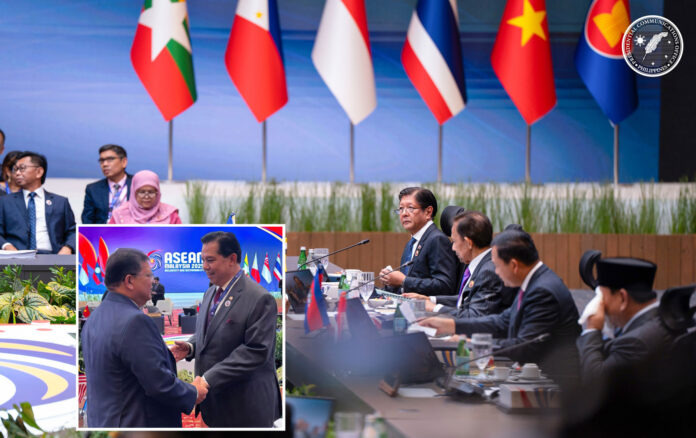Warns maritime tensions threaten region
President Ferdinand Marcos Jr. yesterday reiterated his call for the urgent adoption of a legally binding Code of Conduct (COC) in the South China Sea, warning that geopolitical tensions over maritime claims threaten stability and progress across Southeast Asia.
Speaking at the plenary of the ASEAN Summit hosted by Malaysia Mr. Marcos underscored the need for a formal agreement to protect the maritime rights of regional states.
“We underscore the urgent need to accelerate the adoption of a legally binding Code of Conduct in the South China Sea to safeguard maritime rights, promote stability, and prevent miscalculations at sea,” President Marcos told fellow ASEAN leaders.
The South China Sea, a vital global shipping route, has long been a flashpoint between China and several ASEAN member states —the Philippines, Vietnam, Malaysia, and Brunei — all of which have overlapping territorial claims. While talks between ASEAN and China have been ongoing for years, a binding code has yet to materialize.
The Philippines has consistently pushed for a stronger regional response to assert the rule of law and uphold the 1982 United Nations Convention on the Law of the Sea (UNCLOS), which the country has cited in its landmark 2016 arbitral victory over China’s sweeping maritime claims.
“In this increasingly interconnected world, we find ourselves, and our gains, at risk when our current stability is challenged,” he said, pointing to the potential for disruptions not only to supply chains but to the hard-earned development of ASEAN economies.
House Speaker Martin Romualdez, for his part, urged Southeast Asian lawmakers to defend the rules-based international order during the 14th ASEAN Leaders Interface with Representatives of the ASEAN Inter-Parliamentary Assembly (AIPA).
“We must move as one — translating ASEAN’s collective aspirations into concrete policies that empower our workers, farmers, and fisherfolks, protect our seas, connect our digital economies, and defend the rules-based international order,” he said.
“As parliamentarians, we are not just lawmakers; we are bridge-builders across nations, generations, and ideologies. And it is our duty to ensure that this region remains a bastion of peace, prosperity, and shared progress…Our region cannot afford to be passive in a world that is increasingly polarized,” Romualdez added.
Fight for the climate-vulnerable
President Marcos also placed climate change at the forefront of his address to Southeast Asian leaders, urging stronger regional collaboration and significantly increased climate financing to confront what he described as “the most defining and cross-cutting challenge of our time.”
“As one of the most climate-vulnerable regions globally, nearly half of the entire ASEAN population faces significant climate-related risks,” he said.
The President underscored the Philippines’ role in the global climate response, highlighting its position as host of the Board of the Loss and Damage Fund — a major financial mechanism established under the United Nations climate framework to support countries most affected by climate impacts.
“As the host of the Board of the Fund for responding to Loss and Damage, the Philippines will continue to advocate for scientific and evidence-based, investment-led, and transformative solutions to the climate crisis,” he said.
The Philippine leader called on ASEAN’s external partners to scale up support by ensuring predictable, accessible, and adequate climate finance.
He argued that such funding is essential for ASEAN nations to meet their climate ambitions, adapt to rising threats, and shield their people from worsening environmental and economic disruptions.
‘Deep concern’ on tariffs
According to a draft statement, ASEAN leaders are also set to express “deep concern… over the imposition of unilateral tariff measures” by the United States saying they “pose complex and multidimensional challenges” to the bloc.
But ASEAN said this year it would not impose retaliatory tariffs on the United States.
Malaysian Prime Minister Anwar Ibrahim said Monday he had written to Trump to request an ASEAN-US summit this year — showing “we observe seriously the spirit of centrality.”
His foreign minister Mohamad Hasan said Sunday that the United States had not yet responded.
Trump cast international markets into turmoil in April when he announced wide-ranging tariffs, before agreeing to pause them for most countries for 90 days.
Bilateral talks between the ASEAN member states and Washington are in progress, but the bloc is still presenting a united front, according to Malaysia, which holds the rotating ASEAN chairmanship this year.
Myanmar conflict
On Sunday, Malaysia tried to increase pressure on member state Myanmar’s junta, whose leaders are barred from ASEAN summits over a lack of progress on a five-point peace deal agreed on by the bloc in 2021.
“One thing for sure that we agreed is that Myanmar’s government… must comply with the five points consensus which they themselves agreed on as one of the signatories,” Malaysian Foreign Minister Mohamad Hasan said.
ASEAN has led so far fruitless diplomatic efforts to end the conflict, triggered when the junta staged a coup deposing civilian leader Aung San Suu Kyi in February 2021.
Mohamad called Sunday for an extension and expansion of a ceasefire declared after a deadly earthquake, despite ongoing fighting bringing its effectiveness into question.
Meanwhile, ASEAN may add an 11th member state before the end of the year, the top diplomat said.
East Timor, Asia’s youngest nation, “has made meaningful progress in implementing a roadmap” and there is “strong support” for it to “hopefully” join the bloc by the next summit in October, he said.
After meeting leaders on Monday, East Timor’s prime minister told reporters he believed his country would become a full member this year, despite still needing to fulfil a few remaining criteria.
“Because everyone supports. Everybody. It was incredible,” Xanana Gusmao told reporters. With AFP








